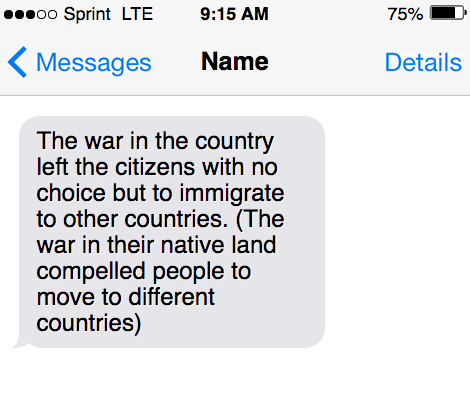What is the difference between emigrate and immigrate? People move from one place to another, one country to another, searching for a job, starting a business, studying, joining their spouse working there, and for many other reasons. In this context, you come across these two words that are commonly used.
Have you heard of the words “immigrate” and “emigrate”? Do they sound familiar? Are they the same? Do you always get confused between them while using them in a sentence?
Learn everything about the word immigrate and emigrate. Know the meaning, remember the difference easily, and use the words in sentences, synonyms, and antonyms.
What does “emigrate” mean?
The word emigrate means to permanently leave one’s own country and settle in another country. Here the emphasis is on leaving one’s own country.
| Word | Definition |
| Emigrate (verb) /ˈeməˌɡrāt/ | leave one’s own country in order to settle permanently in another. |
| Immigrate (verb) /ˈiməˌɡrāt/ | come to live permanently in a foreign country. |
What does “immigrate” mean?
To immigrate means to come to a country that is not your own and live there permanently. Here, the emphasis is on coming to another country and settling there.

When to use “emigrate”?
When you leave your own country and live in another country, you are emigrating from your country. Emigrating focuses on leaving one’s own country. It takes the preposition “from” after the word emigrate or emigrating.
Sentence examples
Angelina Jolie, the famous actress, emigrated from the US to live in France and England. (Angelina Jolie left the country she was born to live in France and England)
People from developing countries emigrate from their native countries to Western countries in search of good, high-paying job opportunities. (People leave their country and go to other countries in search of good jobs)
Albert Einstein, a famous scientist, emigrated from Germany to the US in 1933. (Albert Einstein, born in Germany, left his native country to live permanently in the US)
Synonyms
Migrate, resettle, hello, relocate, remove, move abroad, leave, transmigrate, go, go away, go off, quit, exit, part, vacate, forsake, escape, evacuate, flee, abandon, withdraw.
Antonyms
Immigrate, arrive, settle, abide, dwell, lodge, come, remain, stay.
You can find many other related synonyms and antonyms at Merriam Webster.
When to use “immigrate”?
When a person comes to another country to live permanently, use the word “immigrate.” The word “immigrate” focuses on coming into another country.
Sentence examples
- The US has more people immigrating than any other country in the world. (Most people are coming to the US than any other country)
- More than 7 million Ukrainians have immigrated to different countries because of Ukraine-Russia conflict. (People from Ukraine have come to different countries because of the conflict in their home country)
- The conflict in the country left the citizens with no choice but to immigrate to other countries. (The conflict in their native land compelled people to move to different countries)

Synonyms
Settle, migrate, transmigrate, colonize, arrive, establish, move in, come in, go in .
Antonyms
Emigrate, stay, remain, come, settle, drift, move, shift, quit, depart, wander, displace, vacate, replant, evacuate, move abroad, relocate, resettle, move away.
For more words related to immigrate, visit WordHippo!
How to remember which form to use
Immigrate and emigrate are two words that people are often confused about while using.
Here is a method to remember when to use each word.
Immigrate- Relate the first two letters of “immigrate,” “im,” to “in.” Further, link this “in” to “into or to a country.”
So, immigrate is used when someone enters or comes into a country.
Emigrate- Relate the first letter “e” of emigrate to “exit.”
So, you will remember to use the word emigrate when someone exits a country. Isn’t that simple?
The difference between immigrate, emigrate and migrate
Immigrate and emigrate are both verbs or action words. A person who emigrates has to immigrate elsewhere. “Immigrate is to emigrate” is like “come is to go.” When you talk about departure, you use “emigrate,” and when you talk about arrival, immigrate.
So, when a person leaves his own country to live in another country, you say the person has emigrated. When a person enters another country (not his own) to settle down permanently, he is said to immigrate into the country.
When you move from one place to another, one region to another, like the birds, you are migrating. The movement, in general, is called migration. The word is also used for the movement of the birds and animals seen yearly. They migrate from the cold climate to warmer places in search of food and water, which is convenient for their reproduction.
For more details, click here.
Fill in the blanks with “immigrate” or “emigrate.”
- Albert Einstein _________________ from Germany to the United States as he faced death threats by the Nazis.
- People __________________ to different countries, believing the foreign land to give them better life than their motherland.
- In spite of strict vigilance, some manage to illegally ______________ to different countries.
- Sheryl happily _____________ from her homeland to join her husband in the distant land.
Find the correct answers below
(The exercise will have made it clear how well you have understood the difference between immigrate and emigrate. If you have got all the answers right, you have correctly understood the difference. However, if you got any of it wrong, go through the above points again to understand it better)
Answers to fill in the blanks
1. emigrated
2. immigrate
3. immigrate
4. emigrated
Sources
- antonyms and synonyms for emigrate – Merriam-Webster
- What is another word for immigrate-wordhippo
- Learn English: Migrate, emigrate, and immigrate-abc.net.au
- Emigrate vs. Immigrate: What Are the Differences Between Immigration and Emigration?- writingexplained
Inside this article
Fact checked:
Content is rigorously reviewed by a team of qualified and experienced fact checkers. Fact checkers review articles for factual accuracy, relevance, and timeliness. Learn more.
Core lessons
Glossary
- Abstract Noun
- Accusative Case
- Anecdote
- Antonym
- Active Sentence
- Adverb
- Adjective
- Allegory
- Alliteration
- Adjective Clause
- Adjective Phrase
- Ampersand
- Anastrophe
- Adverbial Clause
- Appositive Phrase
- Clause
- Compound Adjective
- Complex Sentence
- Compound Words
- Compound Predicate
- Common Noun
- Comparative Adjective
- Comparative and Superlative
- Compound Noun
- Compound Subject
- Compound Sentence
- Copular Verb
- Collective Noun
- Colloquialism
- Conciseness
- Consonance
- Conditional
- Concrete Noun
- Conjunction
- Conjugation
- Conditional Sentence
- Comma Splice
- Correlative Conjunction
- Coordinating Conjunction
- Coordinate Adjective
- Cumulative Adjective
- Dative Case
- Determiner
- Declarative Sentence
- Declarative Statement
- Direct Object Pronoun
- Direct Object
- Diction
- Diphthong
- Dangling Modifier
- Demonstrative Pronoun
- Demonstrative Adjective
- Direct Characterization
- Definite Article
- Doublespeak
- False Dilemma Fallacy
- Future Perfect Progressive
- Future Simple
- Future Perfect Continuous
- Future Perfect
- First Conditional
- Irregular Adjective
- Irregular Verb
- Imperative Sentence
- Indefinite Article
- Intransitive Verb
- Introductory Phrase
- Indefinite Pronoun
- Indirect Characterization
- Interrogative Sentence
- Intensive Pronoun
- Inanimate Object
- Indefinite Tense
- Infinitive Phrase
- Interjection
- Intensifier
- Infinitive
- Indicative Mood
- Participle
- Parallelism
- Prepositional Phrase
- Past Simple Tense
- Past Continuous Tense
- Past Perfect Tense
- Past Progressive Tense
- Present Simple Tense
- Present Perfect Tense
- Personal Pronoun
- Personification
- Persuasive Writing
- Parallel Structure
- Phrasal Verb
- Predicate Adjective
- Predicate Nominative
- Phonetic Language
- Plural Noun
- Punctuation
- Punctuation Marks
- Preposition
- Preposition of Place
- Parts of Speech
- Possessive Adjective
- Possessive Determiner
- Possessive Case
- Possessive Noun
- Proper Adjective
- Proper Noun
- Present Participle
- Prefix
- Predicate



